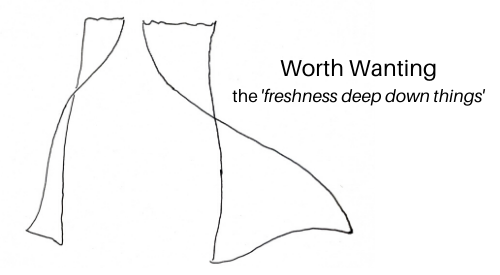
Listening to a set of lectures recently on the New Testament, it occurred to me to ask: how is it we apprehend divinity? Early Christians clearly thought they were regularly in touch with someone from beyond this world, a divine presence. What experiences might they have had that convinced them of this? Early writings say such experiences occurred frequently within the various gatherings without quite making clear what they were of.
Visions, voices, cures, coincidences, signs and wonders generally, abound in religious texts. What, I would like to know though, is the special quality of an experience that convinces us: here is a presence of something or someone not mundane, not of this world, something or someone transcendent, from outside, ex ultra, and yet relevant. Responses like wonder and awe are frequently recorded, but in response to what exactly? Absent these reactions, is the experience then not of something transcendent? [My question is not whether these experiences are actually of something transcendent, but if, intellectually, we accept the notion of the transcendent, what experiences might qualify as indicative of it.]
I don’t have answers about early Christianity, but I do have ideas about one way we can and do regularly experience transcendent presence: encounters.
I think that a certain kind of experience I call freshness is, in fact, is of a presence which is convincingly transcendent, that is from beyond this mundane world of space, time and number constraints. This experience is not unfamiliar to us, not necessarily infrequent or special, but of transcendence nonetheless. Our reactions to this experience may vary from awe to of course, and we may take careful notice or barely register it, but the experience itself is a perception, as convincing as seeing, hearing or touching, of the presence of an actual something or someone, of its otherness to us and to this world, and of its relevance.
Do I posit another perceptive sense in addition to the ones that pick up on light, sound, substantiality and so on? A sense that picks up on the presence of transcendence? Yes. The senses of sight, etc. have specialized organs devoted to picked up particular kinds of energy. Does this sense I’m talking about have the same? I say yes again, but of a different kind. To make an analogy, organ of perception is one’s livingness, and the medium of transmission is the livingness field, and what radiates livingness ‘energy’ is the presence. To tighten this all up, this sense is about livingness, the ambition for encounters, the openness to others and othernesses, a dynamic quality.
When, for instance, we use the phrase ‘a sense of the room’, we’re talking about multiple perception involving, of course, sight, sounds, smell, etc. but also memory and logic altogether in a composite interpretation of what’s around us or what or who is in front of us. The sense of transcendent presence is interpretive in the same way, but the primary ‘sensation’ is has to do with the promptings we feel to invite or accept invitations to encounter, with the feeling of continuity in the course of encounters, and with the kind of inner glow that extends to or grows on reflection. Reflection on any particular encounter in the context of a lifetime of encountering, and thoughts about encounters generally can lead us to the interpretation: we were in the presence of the transcendent: “Our hearts were strangely warmed.”
This is not a sense of presence as concrete as Samuel Johnson’s stone, but its at least as robust as, say, the presence of Area 18 police presence in my neighborhood, or of other wifi users in my vicinity, and sometime even more direct.
A lot of what determines whether we sense presence has to do with our prior presuppositions. An insect landing and walking on my arm may not be aware of my presence other than as just a warm and hairy surface.
Presence is a continuum. Objects have presence, people have presence, others addressing us have another kind of presence. On a sidewalk, signs are a presence, the other pedestrians are a presence, the person I’m talking with is a presence, and these are all different in terms of that they are what they are for or to me.
My claim is that the presence of transcendent freshness can sometimes be at that highest level of immediacy and relevance.
What makes this presence transcendent is its feyness, its otherness, its distinctness from the mundane considerations of survival, comfort or dignity, its sense of something deeper, broader, of breakthrough, its ability to surprise and invent, its wonder, admiration and gratitude and sense of grace, of abundance, of freshness from beyond instead of staleness, of meaning and intrinsic and lasting value, and this linked to a world view that links my narrative with a larger one that isn’t impossible or necessarily make-believe, and this larger narrative convincing on a day to day experiential basis.
Let’s start with the way we experience the presence of any other in any encounter.
When I address myself to an other as you, I stand at the shoreline where my apprehension of the other as you yourself, and the other’s apprehension of itself as itself, ebb and flow like swash lines on the sand, the lines of livingness. In this place the strict distinction between I and you is eased; different perspectives can be, for a time, exchanged; and an intimacy of playful tit-for-tats, back and forth, of dynamic over and under entwinements ensues. This is not an immersion, an incorporation, or a dissolution of one in the other. The end of encounters is not the production of one substance, but an active and ongoing intimacy between an entangled two.
[The point of maximum acuity on our retinas is the fovea. To see most clearly, we turn our eyes to bring that point to bear on the object of our attention. We do pick up images on other parts of our eye, but they are sharp, less complete.]
[Every encounter is an occasion of one making common cause with the livingness of an other addressed as you. The third party in any encounter hosting, mediating and giving gifts is transcendent freshness.]
In encounters, our foveal apprehension is of the presence of the other, and the presence of freshness in the encounter is part of our peripheral awareness, seen out of the corner of the eye, like a glimpse of just the partial shape of something moving in the bushes off to the side. It’s only in reflection that we become as aware of the presence of what was on the periphery as we were immediately aware of the presence of the other at the center of our attention. We might call this process fovealization, the bringing into focus of what was on the periphery. So we may apprehend freshness, of God as freshness, through a process of fovealization. This apprehension is not an indirect conviction or inference, but a peripheral perception brought into foveal focus.
In solo prayer, my foveal apprehension is of freshness itself, and not to any other other. It’s through the intimate fluctuations and dynamics of the livingness field that we, I and freshness, share and communicate, and in are the basis of my sense of the actual presence of freshness, of God as freshness. At that time, my other others, the localized others, are present only my peripheral awareness, to be brought into foveal apprehension later through the process of reflection. Mystical experience may work this way but not all prayer is mystical.
How might a congregation or gathering of two or more experience the presence of freshness, of God as freshness? When several address themselves, in individually different or ritualistically uniform ways, to freshness as other to each other, two things happen at the same or close to the same time: 1. each holds freshness in his or her foveal awareness, and fellow congregants in peripheral awareness, and 2. each holds individual others, or the assembly as a whole, in foveal awareness, and freshness in peripheral. These peripheral awarenesses overlap and reinforce each other, moving our awareness of the presence of freshness itself, and of freshness as a presence for others, from peripheral awareness to foveal apprehension without the distance required by reflection, such that we have a compelling and immersive experience of the presence of freshness, of God as freshness, as the encounter is actually happening, and of course, afterwards.
Might this have been something like the core experience of the early church that the writings of the New Testament presuppose, but don’t directly describe?
